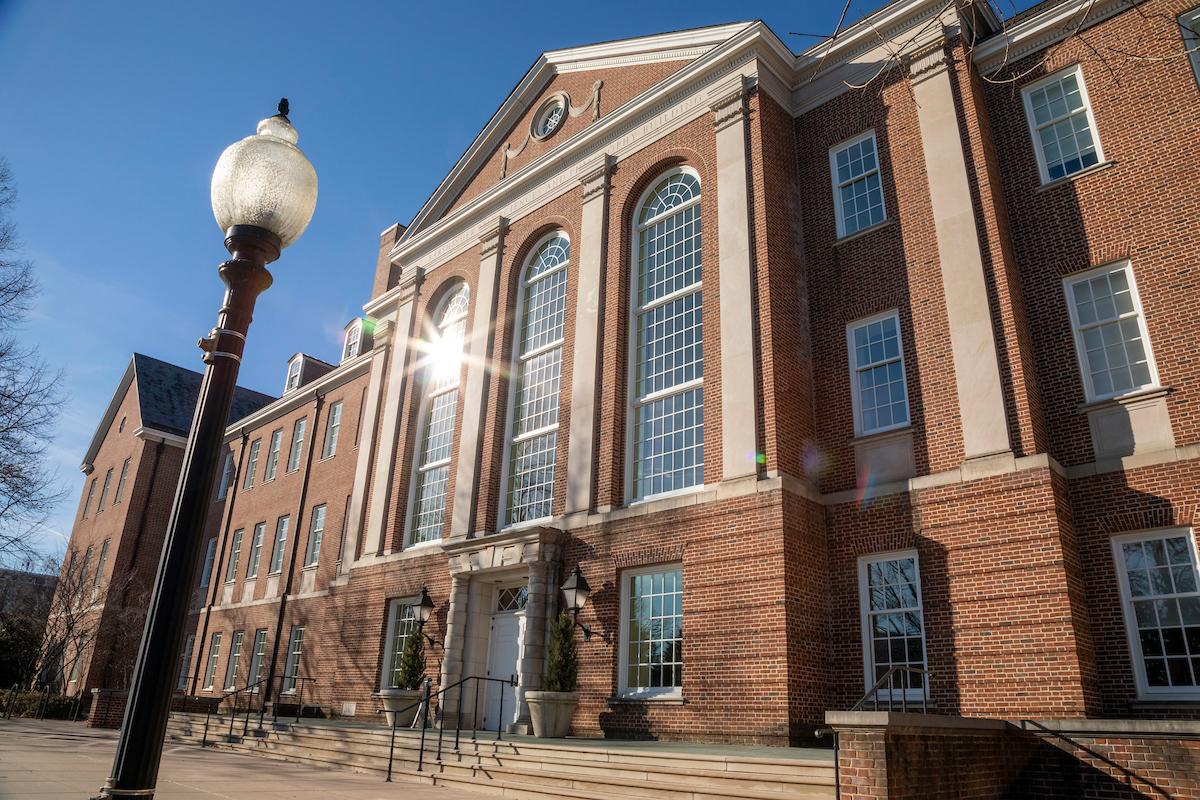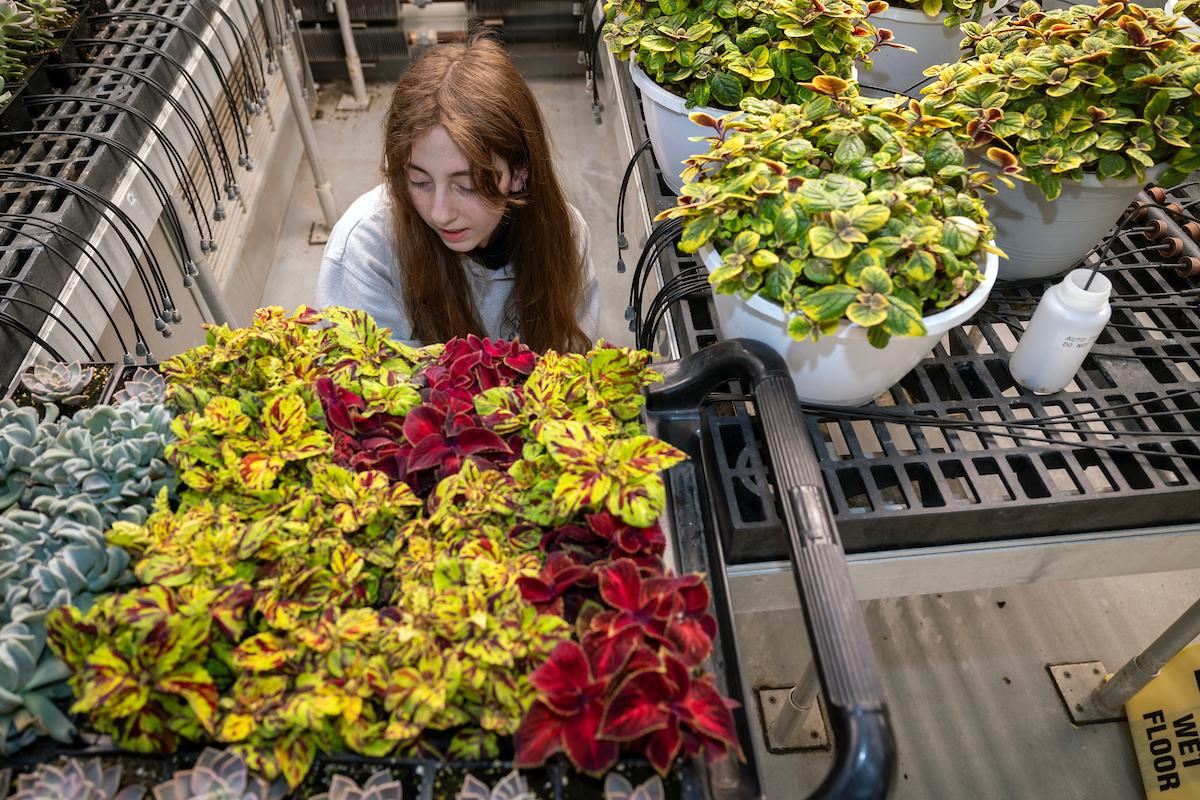Biology
About Biology
Our Program and Courses
As a biology major, you will learn how to tackle questions about both the known and the undiscovered as you study all forms of life through hands-on exploration, individualized instruction and a collegial learning atmosphere. This program will prepare you to evaluate and address important questions in one of the most rapidly expanding fields of knowledge. Your learning won’t take place in the classroom alone; you often will be designing, conducting and analyzing research in the field or laboratory. Whether focusing on your findings in the teaching lab or embarking on independent and collaborative research, you’ll be supported by F&M’s cutting-edge field, laboratory, and computing equipment.
By the time you graduate, you will:
- Learn concepts from across the breadth of biological disciplines, with depth in focused areas of interest.
- Utilize quantitative skills to develop and test novel research questions, ethically and in collaboration with others.
- Synthesize and expand upon existing scientific theories and models by critically and analytically engaging with literature.
- Hone skills as effective scientific communicators, through both writing and speaking.
Curious what biology classes are like? Take a look at our course catalog to see the depth and breadth of what’s available to you, including related majors in biochemistry and molecular biology, bioinformatics, neuroscience, animal behavior, earth and environmental science, environmental studies, and public health.
Our Facilities and Resources

The Barshinger Life Sciences & Philosophy Building
The Barshinger Life Sciences & Philosophy Building features 12 student-faculty research laboratories, a greenhouse, and animal rooms. Specialized facilities and research equipment include a confocal microscope, preparative and ultracentrifuges, electrophoresis equipment, a dark room, a cold room, a quantitative thermal cycler, a plant growth facility, a vivarium, and controlled environment chambers. A variety of equipment is also available for terrestrial and aquatic field studies.
Greenhouse
You can also enjoy hands-on experience in F&M’s greenhouse, which sits atop the Barshinger Life Sciences & Philosophy Building on campus. In the greenhouse, you can learn how to plant, water, fertilize, trim, transplant, and assist in pest control of a variety of plants. Many of these plants are used in F&M courses, but some are also used to enliven College events, such as Commencement. If you have questions about the greenhouse, you can reach out to our greenhouse manager, Jim Engleman, at jenglema@fandm.edu.
Learning Outside the Classroom
In the Field
F&M’s location provides the perfect landscape for studying biology. Lancaster County’s flourishing agricultural countryside, the nearby Susquehanna River, diverse nature preserves managed by the Lancaster Conservancy, and F&M’s Spalding Nature Conservancy provide exciting opportunities for field research.
You can also enjoy hands-on experience in our facilities in the Barshinger Life Sciences & Philosophy Building on campus. The building features 12 student-faculty research laboratories, a greenhouse, and animal rooms. Specialized facilities and research equipment include a confocal microscope, preparative and ultracentrifuges, electrophoresis equipment, a dark room, a cold room, a quantitative thermal cycler, a plant growth facility, a vivarium, and controlled environment chambers. A variety of equipment is also available for terrestrial and aquatic field studies.
Research Opportunities
Every student at F&M has extraordinary opportunities to engage in independent or faculty-led research. These are not experiences you have to wait until graduate school to pursue. Our students’ research has been published in leading scholarly journals, and your professors will be there every step of the way to mentor and advise you in your journey. In fact, biology faculty are expert researchers working on a wide array of cutting-edge topics, including:
- Bioinformatics
- Biomechanics
- Cell Biology
- Developmental Biology
- Ecology
- Genetics and Genomics
- Immunology
- Limnology
- Marine Biochemistry
- Microbiology
- Molecular Genetics
- Muscle Physiology
- Neuroscience
- Ornithology
- Plant Development, Ecology, and Reproduction
- Public Health
- Sustainability
Off-Campus Study
In addition to research opportunities at F&M, you’re encouraged to explore activities
off campus. Biology students have traveled for internships around the world, studied
tropical biology in Central and South America, Australia, and Africa; engaged in marine
biology research in the Caribbean, Galapagos, East Africa, Australia and the South
Pacific, and have completed research at various field courses across the U.S. and
internationally.
Explore off-campus study at F&M
Success Beyond F&M
What happens after you graduate with a degree in biology? Many students go onto graduate school or choose to embark on their chosen career path. You’ll also find recognition and support in the Benjamin Rush Pre-Health Honor Society, an organization that hosts programs and events and creates a sense of community among outstanding students interested in the health professions.
Graduate School
More than half of our majors in the biology-related fields go on to graduate or professional school after F&M. In any given year, about one-third of our graduates enter medical school or another health professions graduate program, while another one-third enter other forms of graduate study. Their individualized learning and hands-on experience while at F&M gives them an advantage in getting admitted into some of the nation’s finest graduate programs, including University of Michigan, Yale University, Cornell University, Harvard University, and Duke University. They pursue research in disciplines as diverse as biological chemistry, marine biology, plant biology, organismal biology, ecology, evolutionary biology, biomedical studies, immunology, cancer biology, and biomechanics. In biomedical fields, graduates have specialized health-related areas such as medicine, dentistry, nursing, veterinary medicine, pharmaceutical research, nutrition, sports medicine, physical therapy, and health care administration.
Career Paths
Biology majors are prepared for careers in a wide array of fields, due to the program’s emphasis on the breadth of biology and its association with other natural sciences. Our alumni have found success in sports medicine, genetic counseling, patent law, and high school teaching. They hold positions such as:
- Agricultural Consultant
- Biostatistician
- Conservation Engineer
- Dentist
- Ecologist
- Environmental Research Manager
- Forensic Biologist
- Healthcare Administrator
- Marine Biologist
- Medical Researcher
- Molecular Biologist
- Nurse
- Nutritionist
- Pharmaceutical Researcher
- Physical Therapist
- Physician
- Veterinarian
- Wildlife Biologist
Student Spotlight
Juliana Scheick '26 Elevates Equine Health Through Hands-On Research
Biology major Juliana Scheick ’26 has always loved horses and medicine. This summer,
she found a perfect synergy between her passions: a student research assistantship
in the equine pharmacology laboratory at the University of Pennsylvania School of
Veterinary Medicine.
“The main goal of our research is to identify potential precursors of injury on the
racetrack, as well as the effects of drug use in the racehorses. We will be working
closely with the Pennsylvania Equine Toxicology Research Laboratory and the Pennsylvania
Racehorse Commission to improve the welfare of horse racing,” she said. “Besides learning
new research techniques and gaining more experience in the lab, I have the opportunity
to better the lives of the racehorses and the reputation of the sport.”Alumni Spotlight
“You'll never have a life-changing moment unless you try something new.”
In her junior year at F&M, biology major Elizabeth Heppenheimer ’14 signed up for
a science writing course “for fun,” but, “by the end of the semester, I was considering
scrapping my plans to apply to doctoral programs in biology and pursuing a career
in science journalism instead,” she said. “Ultimately, my career landed somewhere
in the middle.”
Heppenheimer is now senior manager of the Pathogen Genomics Education Program at The
Broad Institute of MIT and Harvard.
“I'm still very connected to the scientific research world, but my role is to teach
others about that research – which is exactly the right fit for me,” she said.
Heppenheimer encouraged students to dive into subjects they’re interested in, even
if it’s outside their academic comfort zone.
“College might be the only time in your life where you'll have the opportunity to
try something for a couple of months with very few consequences if it turns out not
to be the right fit,” she said. “You almost never know in the moment that an experience
will change your life, but you'll never have a life-changing moment unless you try
something new.”
Read More »Student Spotlight
“I’ve always been passionate about helping people and have been drawn to health care.”
Faisal Niazi ’27 spent his summer learning to be an EMT through an internship with
Harrisburg Area Community College and Penn Medicine/Lancaster General Health.
“I’ve always been passionate about helping people and have been drawn to health care.
The opportunity to make an important difference in someone's life during their most
vulnerable moments is what motivated me to pursue EMT training,” he said.
Niazi, a biology and public health double major, plans to attend medical school to
become a surgeon. He believes his hands-on experience as an EMT will support this
goal.
“It felt like the right step toward gaining more real-world exposure in the health
care field and solidifying my interest in pursuing a medical career,” he said.
Read More »
Faculty Spotlight: Dan Ardia
Explore biological processes at their smallest scale. At its core, Biochemistry &
Molecular Biology at F&M focuses on the structure and function of biomolecules, which
are the metabolic machinery of the cell and control its underlying genetics. Immerse yourself in a rapidly-expanding field that combines the study of biology,
chemistry, computer science, and applied mathematics. By studying bioinformatics at
F&M, you’ll explore how to develop methods and software tools for understanding biological
data. As a student of neuroscience at F&M, you will not only learn how the brain works,
but contribute to the ever-growing body of information on this unique organ. Using
a blend of knowledge and tools taken from the fields of biology, chemistry, physics,
mathematics, and psychology, you’ll develop a rich understanding of both the physical
and social functions of the brain.Related Fields of Study
Biochemistry & Molecular Biology
Bioinformatics
Neuroscience
F&M Biology in Action
June 27, 2025
The (Diplomat) Way of St. James
Completing the Camino de Santiago is often a once-in-a-lifetime experience. But Johansen Vargas '26 and David Nieves '27 have accomplished this feat twice. The two were selected as student leaders for F&M on the Camino.
June 3, 2025
How Do F&M Students Spend Summer Break?
What do F&M students do during the summer? Hear from 10 students and recent graduates to see the breadth of possibilities available, from internships and classes to travel and personal development.
April 28, 2025
Kramer Returns to F&M as Provost
Sunita Gupta Kramer, dean of the School of Science at The College of New Jersey (TCNJ), has been named provost and dean of the faculty at Franklin & Marshall College. Kramer, who earned her bachelor’s degree in biology from F&M in 1992, begins her F&M responsibilities July 1.
